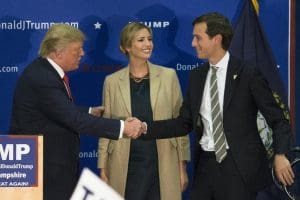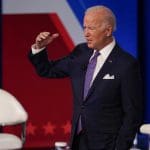Trump flouts federal anti-nepotism law by appointing son-in-law chief advisor
President-elect Donald Trump has faced numerous ethical conflicts during his transition period, including refusing to divest from his business holdings and many of his cabinet nominees failing to turn in their ethics paperwork. Now he is adding nepotism to his growing list of unprecedented hostilities to established ethical standards and federal law by naming Jared Kushner, a New […]

President-elect Donald Trump has faced numerous ethical conflicts during his transition period, including refusing to divest from his business holdings and many of his cabinet nominees failing to turn in their ethics paperwork.
Now he is adding nepotism to his growing list of unprecedented hostilities to established ethical standards and federal law by naming Jared Kushner, a New York real-estate investor who is also his son-in-law, as a senior White House advisor.
Trump has given Kushner access to his transition team ever since the election, at one point trying to invite him to daily briefings, and now he has made it official.
BREAKING: President-elect Trump's son-in-law, Jared Kushner, will be named to position of Senior Advisor to the President, aide tells NBC.
— CNBC (@CNBC) January 9, 2017
On paper, this is illegal. 18 U.S.C. § 3110 bans federal officials from appointing their relatives:
(b) A public official may not appoint, employ, promote, advance, or advocate for appointment, employment, promotion, or advancement, in or to a civilian position in the agency in which he is serving or over which he exercises jurisdiction or control any individual who is a relative of the public official.
But according to the New York Times, Kushner’s lawyers think that they have found a loophole:
Mr. Kushner, who declined to be interviewed for this article, has hired a leading Washington law firm, WilmerHale, to advise him on how to comply with federal ethics laws should he join the White House staff as an adviser to the president. The firm has concluded that one potential sticking point, a federal anti-nepotism law, is not applicable, though not all ethics experts agree. While the law prohibits federal officials from hiring relatives for agencies they lead, Mr. Kushner’s lawyers argue, among other things, that the White House is not an agency and is therefore exempt.
This is an extraordinary argument. To say the White House is exempt from nepotism laws because it is “not an agency” is to effectively say that the presidency is less important than the cabinet agencies, or all of the other low-level offices in the federal government.
And to be clear, Kushner is a problematic choice even beyond the nepotism. He has a disturbing conflict of interest of his own, as he is currently pursuing investment in Chinese real estate at the same time he would be advising the President of the United States — and is, in fact, reportedly already advising him:
Indeed, despite a lack of foreign policy experience, Mr. Kushner is emerging as an important figure at a crucial moment for some of America’s most complicated diplomatic relationships. Such is his influence in the geopolitical realm that transition officials have told the Obama White House that foreign policy matters that need to be brought to Mr. Trump’s attention should be relayed through his son-in-law, according to a person close to the transition and a government official with direct knowledge of the arrangement.
The same article notes this additional detail:
Mr. Trump has said that his son-in-law, an Orthodox Jew, will play a central role in dealings with Israel, describing him as so talented that he could help “do peace in the Middle East.” Mr. Kushner’s company has received multiple loans from Israel’s largest bank, Bank Hapoalim. The incoming Trump administration will inherit a Justice Department investigation into allegations that the bank helped wealthy Americans evade taxes.
And those are just two of a number of troubling conflicts of interest Kushner brings with him to the White House.
Some of Jared Kushner's many conflicts of interest. Even if he manages to skirt anti-nepotism laws, these should disbar him: pic.twitter.com/Ak8XQ6csQV
— Steven Rattner (@SteveRattner) January 9, 2017
Trump has made abundantly clear that he does not care about the norms or rules attendant to the office of the President. His appointment of his son-in-law to a top position in his administration only confirms this indifference.
Those rules do not exist for no reason. To the contrary, they exist to ensure good governance and trustworthy stewardship of the nation. That Trump thumbs his nose at both tradition and federal law is a grim indication of his failure to prioritize leadership We the People can trust, and of which we can be proud.
(Melissa McEwan contributed to this article.)
Recommended

Biden campaign launches new ad focused on Affordable Care Act
Former President Trump has said he wants to do away with the popular health care law.
By Kim Lyons, Pennsylvania Capital-Star - May 08, 2024
Trump leaves door open to banning medication abortion nationwide
Donald Trump is planning to release more details in the weeks ahead about how his administration would regulate access to medication abortion, according to comments he made during a lengthy interview with Time magazine published Tuesday.
By Jennifer Shutt, States Newsroom - April 30, 2024
Biden on abortion rights: President expects to give speech Tuesday on new Florida 6-week ban
‘Having the president of the United States speaking out loud and with confidence about abortion access is a great thing’
By Mitch Perry, Florida Phoenix - April 22, 2024











































































